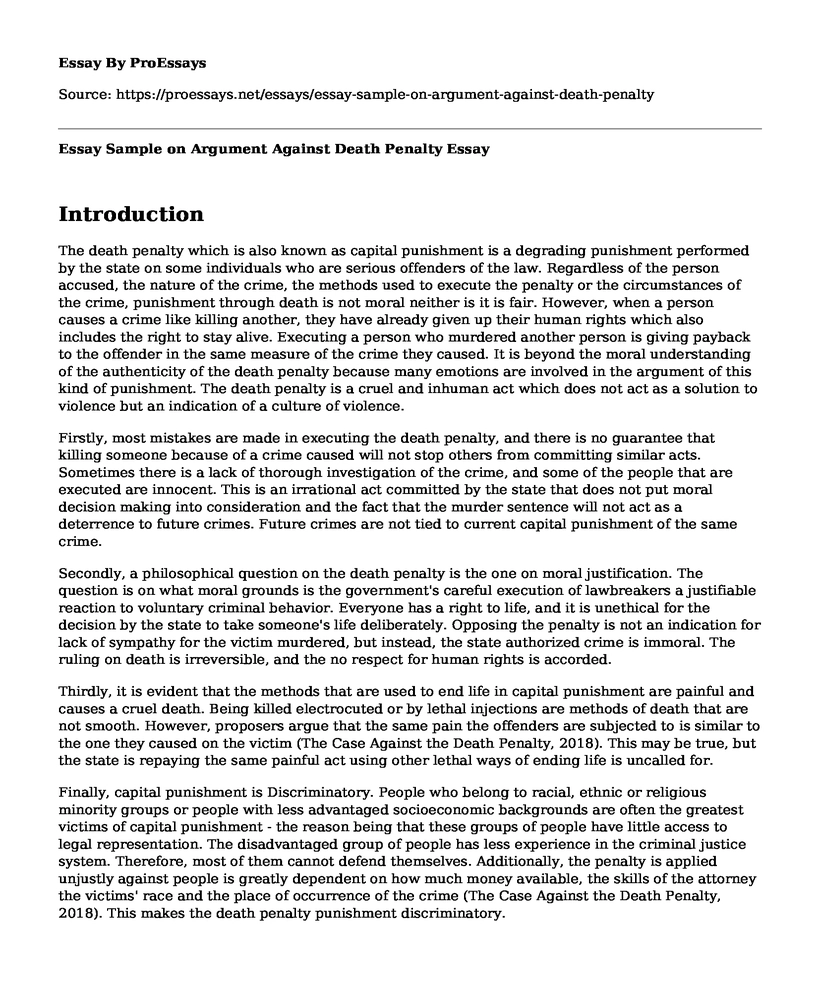Introduction
The death penalty which is also known as capital punishment is a degrading punishment performed by the state on some individuals who are serious offenders of the law. Regardless of the person accused, the nature of the crime, the methods used to execute the penalty or the circumstances of the crime, punishment through death is not moral neither is it is fair. However, when a person causes a crime like killing another, they have already given up their human rights which also includes the right to stay alive. Executing a person who murdered another person is giving payback to the offender in the same measure of the crime they caused. It is beyond the moral understanding of the authenticity of the death penalty because many emotions are involved in the argument of this kind of punishment. The death penalty is a cruel and inhuman act which does not act as a solution to violence but an indication of a culture of violence.
Firstly, most mistakes are made in executing the death penalty, and there is no guarantee that killing someone because of a crime caused will not stop others from committing similar acts. Sometimes there is a lack of thorough investigation of the crime, and some of the people that are executed are innocent. This is an irrational act committed by the state that does not put moral decision making into consideration and the fact that the murder sentence will not act as a deterrence to future crimes. Future crimes are not tied to current capital punishment of the same crime.
Secondly, a philosophical question on the death penalty is the one on moral justification. The question is on what moral grounds is the government's careful execution of lawbreakers a justifiable reaction to voluntary criminal behavior. Everyone has a right to life, and it is unethical for the decision by the state to take someone's life deliberately. Opposing the penalty is not an indication for lack of sympathy for the victim murdered, but instead, the state authorized crime is immoral. The ruling on death is irreversible, and the no respect for human rights is accorded.
Thirdly, it is evident that the methods that are used to end life in capital punishment are painful and causes a cruel death. Being killed electrocuted or by lethal injections are methods of death that are not smooth. However, proposers argue that the same pain the offenders are subjected to is similar to the one they caused on the victim (The Case Against the Death Penalty, 2018). This may be true, but the state is repaying the same painful act using other lethal ways of ending life is uncalled for.
Finally, capital punishment is Discriminatory. People who belong to racial, ethnic or religious minority groups or people with less advantaged socioeconomic backgrounds are often the greatest victims of capital punishment - the reason being that these groups of people have little access to legal representation. The disadvantaged group of people has less experience in the criminal justice system. Therefore, most of them cannot defend themselves. Additionally, the penalty is applied unjustly against people is greatly dependent on how much money available, the skills of the attorney the victims' race and the place of occurrence of the crime (The Case Against the Death Penalty, 2018). This makes the death penalty punishment discriminatory.
Conclusion
In conclusion, the death penalty is a cruel and inhuman act which does not act as a solution to violence but an indication of a culture of violence. apital punishment is legal in some countries and illegal in others. The state believes that a punishment should fit the crime. This is means that when one kills another, they should be killed too. There is no deterrence of crime as a result of capital punishment. There is a small chance of executing an innocent person but the fact that there exist the chance makes the act inhuman. Capital punishment is a cruel and unusual crime.
Reference
The Case Against the Death Penalty. (2018). Retrieved from https://www.aclu.org/other/case-against-death-penalty
Cite this page
Essay Sample on Argument Against Death Penalty. (2022, Nov 03). Retrieved from https://proessays.net/essays/essay-sample-on-argument-against-death-penalty
If you are the original author of this essay and no longer wish to have it published on the ProEssays website, please click below to request its removal:
- A Review of Who Freed The Slaves? The Fight Over the Thirteenth Amendment
- Why the Death Penalty Is an Issue in the Criminal Justice System Essay Example
- Speech Example on Gun Laws, Semi-Automatic Weapons, And Strict Background Checks
- Threats of Closing the Southern Border - Essay Sample
- Essay Example on Equality for All: The Handicaps General and Diana Mo
- Research Paper on Hate Crimes: The Ku Klux Klan and Its History
- Paper Example on Four Seasons Washington Loses $1M Jewelry Case







